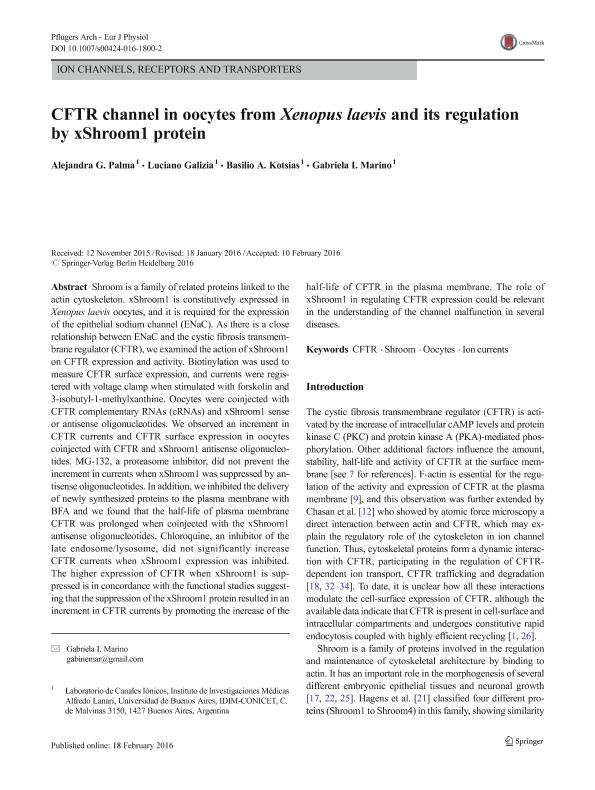Artículo
CFTR channel in oocytes from Xenopus laevis and its regulation by xShroom1 protein
Fecha de publicación:
05/2016
Editorial:
Springer
Revista:
Pflugers Archiv-european Journal Of Physiology
ISSN:
0031-6768
Idioma:
Inglés
Tipo de recurso:
Artículo publicado
Clasificación temática:
Resumen
Shroom is a family of related proteins linked to the actin cytoskeleton. xShroom1 is constitutively expressed in Xenopus laevis oocytes, and it is required for the expression of the epithelial sodium channel (ENaC). As there is a close relationship between ENaC and the cystic fibrosis transmembrane regulator (CFTR), we examined the action of xShroom1 on CFTR expression and activity. Biotinylation was used to measure CFTR surface expression, and currents were registered with voltage clamp when stimulated with forskolin and 3-isobutyl-1-methylxanthine. Oocytes were coinjected with CFTR complementary RNAs (cRNAs) and xShroom1 sense or antisense oligonucleotides. We observed an increment in CFTR currents and CFTR surface expression in oocytes coinjected with CFTR and xShroom1 antisense oligonucleotides. MG-132, a proteasome inhibitor, did not prevent the increment in currents when xShroom1 was suppressed by antisense oligonucleotides. In addition, we inhibited the delivery of newly synthesized proteins to the plasma membrane with BFA and we found that the half-life of plasma membrane CFTR was prolonged when coinjected with the xShroom1 antisense oligonucleotides. Chloroquine, an inhibitor of the late endosome/lysosome, did not significantly increase CFTR currents when xShroom1 expression was inhibited. The higher expression of CFTR when xShroom1 is suppressed is in concordance with the functional studies suggesting that the suppression of the xShroom1 protein resulted in an increment in CFTR currents by promoting the increase of the half-life of CFTR in the plasma membrane. The role of xShroom1 in regulating CFTR expression could be relevant in the understanding of the channel malfunction in several diseases.
Palabras clave:
Cftr
,
Ion Currents
,
Oocytes
,
Shroom
Archivos asociados
Licencia
Identificadores
Colecciones
Articulos(IDIM)
Articulos de INST.DE INVEST.MEDICAS
Articulos de INST.DE INVEST.MEDICAS
Citación
Palma, Alejandra Graciela; Galizia, Luciano; Kotsias, Basilio Aristides; Marino, Gabriela Inés; CFTR channel in oocytes from Xenopus laevis and its regulation by xShroom1 protein; Springer; Pflugers Archiv-european Journal Of Physiology; 468; 5; 5-2016; 871-880
Compartir
Altmétricas




